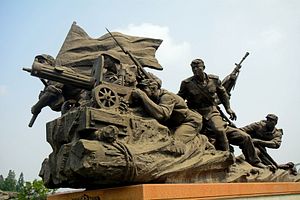The carefully timed speech by North Korea’s ambassador in London, Hyun Hak-bong at Chatham House, a rare outing from a public North Korea official, offered an interesting window into North Korea’s current take on foreign affairs. Justifying North Korea’s right to launch its planned ballistic test, Hyun also outlined how reunification was still its overall aim, and offered some predictably strong criticism of U.S. military drills along with some blunt threats as to the consequences of outside interference in North Korea’s domestic affairs: “We are prepared to launch at any time or any place.”
It is a point that should be emphasized: North Korea’s foreign policy is guided by domestic politics to an extent greater than many outside observers still care to understand. Hyun went to lengths to outline how North Korea only seeks peace, referring to its planned satellite launch, and would much rather develop its economy than its military but cannot do so because of the enemies at its door. Of course, perpetual war benefits the Kim family and allows it to project itself as the bulwark against the constant threat of invasion. The “us against the world” mentality, citing North Korea as a victimized nation that resolutely defends its independence at any cost, is key to the regime’s political survival.
The overriding aim of North Korean foreign policy has been to keep the Kim family in power. In this, it has obviously been successful. From Kim Il-sung to Kim Jong-il and now Kim Jong-un, draconian political control has been a central hallmark of governance. However, no state can remain in power via these means indefinitely, especially after a period of 70 years and now into the third generation of a dynasty, as the fate of countless authoritarian governments leaders over the past century can testify. Yet while it is hard for outside observers to imagine, the Kim’s including Kim Jong-un himself have remained largely popular.
The three leaders have at some point survived famines, political turbulence, and what is today very likely a fairly broad awareness of the comparatively vast riches that exist in the South. Yet heavy propaganda has been extremely effective in creating a perpetual state of war and therefore framing the Kims as the true guardians of the people’s security – a key factor for the support Kim Jong Un currently enjoys. This narrative is much more effective in Korea than it would be for many other states because of Korea’s natural and deep-rooted suspicion of outside interference, a reflection of its historical troubles with foreign powers and indeed the way in which the devastating Cold War carving of Korea led to the DPRK’S very existence.
Still, despite the purposefully calculated bellicose rhetoric, the chances of North Korea initiating overtly aggressive military attacks remain extremely low. Indeed, Pyongyang’s foreign policy raison d’être is the survival of its own ruling elites. It is aware that nuclear war would mean certain defeat, but by allowing Ambassador Hyon to speak in London and proactively state “it is the legitimate right of every country to develop a space program” it keeps the possibility of war on the table. This serves its own self-interest because Pyongyang knows that the illegal proliferation of nuclear weapons has to be taken seriously.
It is a shrewd political tactic. Pursuing nuclear weapons serves four key purposes. First, it allows the leadership to present an image for domestic consumption of North Korea being victimized by its “enemies”; namely, it is not being allowed to pursue a defensive deterrent. That in turn builds more support for the government fighting on behalf of its people. Second, it deflects attention away from the agonizing poverty suffered by the vast majority of North Korea’s 25 million population. Third, despite the UN concluding its Commission of Inquiry in 2014, the nuclear weapons issue still draws attention from its shocking human rights record, with an estimated 120,000 citizens confined in political prison camps. The final purpose is to entrench the leadership’s position by making an outside attack even more improbable. This last is arguably the least important as any attack on North Korea with its huge military and likely support from China would be extremely unlikely.
Economic success and illegal nuclear proliferation are not compatible, yet it is almost certain, notwithstanding the modest economic reforms introduced by Kim Jong-un, that the North will continue to choose the latter. North Korea is still a “war state” and for as long as it manipulates this, a strong foreign policy is still the most effective way for Kim Jong-un to maintain support. It is also aware that expansionist China, despite having huge reservations about Kim’s leadership, needs a stable North Korea more than ever. A politically unstable North is the last thing China needs with its developing interests across the globe. Ultimately, that means a solution to the Korean question remains as elusive as ever.
Jack Hands is a former political advisor, having worked in the U.K. and European parliaments. He has written for several major political blogs, notably Conservative Home. Currently based in Korea, he is a former founder of North Korea Campaign UK, which campaigned for awareness of the plight of political prisoners inside North Korea. Follow him on Twitter @jackhands1.
Correction: An earlier version of this article misstated the North Korean ambassador’s name, the error has been corrected.

































